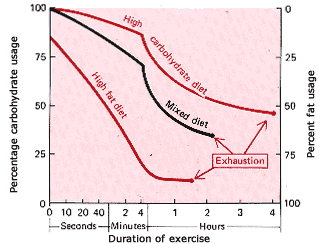|
|
Diet for Athletic Endurance
The endurance factor of the muscles depends on the nutritive support for the
muscle-more than anything else on the amount of glycogen that has been stored in
the muscle prior to the period of exercise. A person on a high carbohydrate diet
stores far more glycogen in muscles than a person on either a mixed diet or a
high fat diet. Therefore, endurance is greatly enhanced by a high carbohydrate
diet.

Effect of duration of exercise as well as type of
diet on relative percentages of carbohydrate or fat used for energy by muscles.
(Based partly on data in Fox: Sports Physiology. Philadelphia, Saunders College
Publishing, 1979.)
Below is a comparative example of diet and the speed at which athletes run for
the marathon race, their endurance as measured by the time that they can sustain
the race until complete exhaustion is approximately the following:
High carbohydrate diet
|
240 minutes |
Mixed diet |
120 minutes
|
High fat diet
|
85 minutes
|
The corresponding amounts of glycogen stored in the muscle are approximately the
following
|
High carbohydrate diet
|
33 grams/kg of muscle
|
Mixed diet
|
17.5 grams/kg of muscle
|
High fat diet
|
6 grams/dg of muscle
|
Though above, we have emphasized the need for a high carbohydrate diet and large
stores of muscle glycogen for maximal athletic performance, this does not mean
that only carbohydrates are used for muscle energy-it means simply that
carbohydrates are by preference. Actually, the muscles often use large amounts
of fat for energy in the form of fatty acids and acetoacetic acid and also use
to a much less extent proteins in the form of amino acids.
Even under the best conditions, in the endurance athletic events that last
longer than 4 to 5 hours the glycogen stores of the muscle become depleted and
are then of little further use for energizing muscle contraction. Instead, the
muscle now depends upon glucose that can be absorbed from the gut, which is
limited, or upon energy from other sources, mainly from fats (as much as 50 to
80 per cent of the energy is being derived from fats rather than carbohydrates
at exhaution).
Not all the energy from carbohydrates comes from the stored muscle glycogen. In
many persons almost as much glycogen is stored in the liver as in the muscles,
and this can be released into the blood in the form of glucose, then taken up by
the muscles as an energy source. In addition, glucose solutions given to an
athlete to drink during the course of an athletic (in optimal concentrations of
2 to 2.5 per cent) can provide as much as 30 to 40 per cent of the energy
required during prolonged events such as marathon races.
In essence, then, muscle glycogen and blood glucose are the energy nutrients of
choice for intense muscle activity. Yet, even so, for a real endurance event one
can expect fat to supply more than 50 per cent of the required energy after
about the first 3 to 4 hours.
Reference used : Sports physiology by Arthur C. Guyton. (Seventh Edition).
|
|
|
|
|









